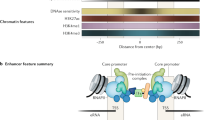Abstract
During the past year two represser molecules were detected, purified and some of their properties determined. The results confirm much of the theory, proposed by Jacob and Monod in 1961, for the control of gene function.
This is a preview of subscription content, access via your institution
Access options
Subscribe to this journal
Receive 51 print issues and online access
$199.00 per year
only $3.90 per issue
Buy this article
- Purchase on Springer Link
- Instant access to full article PDF
Prices may be subject to local taxes which are calculated during checkout
Similar content being viewed by others
References
Jacob, F., and Monod, J., J. Mol. Biol., 3, 318 (1961).
Gilbert, W., and Müller-Hill, B., Proc. US Nat. Acad. Sci., 56, 189 (1966).
Gilbert, W., and Müller-Hill, B., Proc. US Nat. Acad. Sci., 58, 2415 (1967).
Ptashne, M., Proc. US Nat. Acad. Sci., 57, 306 (1967).
Ptashne, M., Nature, 214, 232 (1967).
Author information
Authors and Affiliations
Rights and permissions
About this article
Cite this article
BRETSCHER, M. How Repressor Molecules Function. Nature 217, 509–511 (1968). https://doi.org/10.1038/217509a0
Received:
Issue Date:
DOI: https://doi.org/10.1038/217509a0
This article is cited by
Comments
By submitting a comment you agree to abide by our Terms and Community Guidelines. If you find something abusive or that does not comply with our terms or guidelines please flag it as inappropriate.



